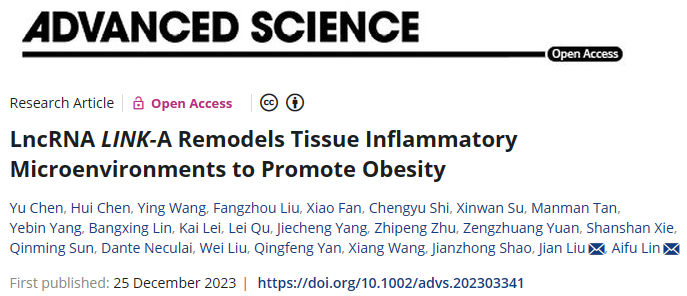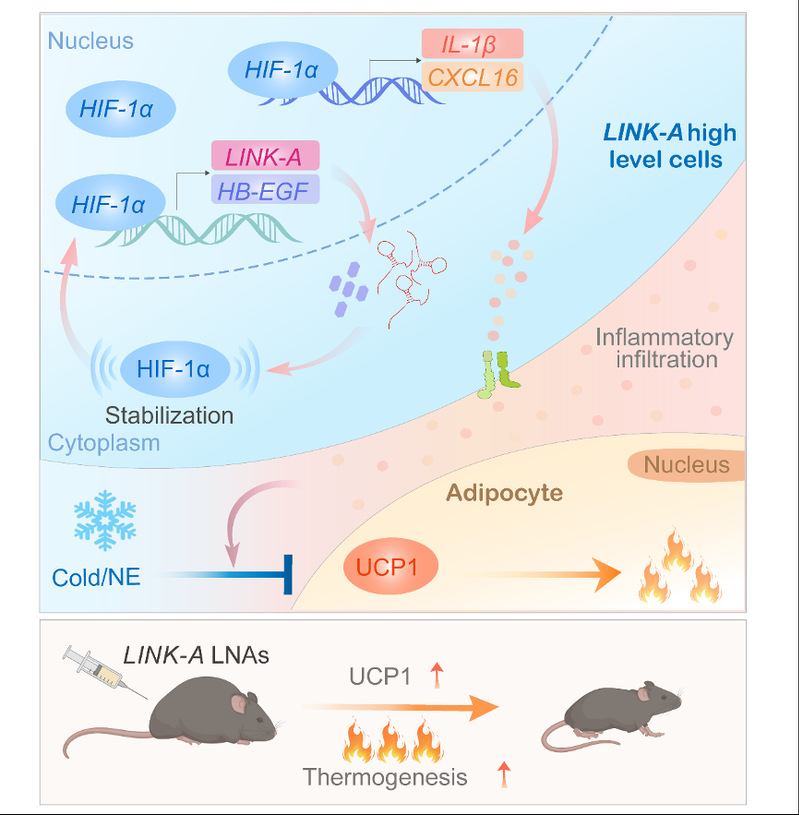Recently, Dr. Jian Liu’s group from Zhejiang University-University of Edinburgh Institute (ZJE) and the collaborators, Pro. Aifu Lin from College of Life Sciences of Zhejiang University, published an article entitled “LncRNA LINK-A Remodels Tissue Inflammatory Microenvironments to Promote Obesity” in Advanced Science. http://doi.org/10.1002/advs.202303341

High-fat diet (HFD)-induced obesity is a crucial risk factor for metabolic syndrome, mainly due to adipose tissue dysfunctions associated with it. However, the underlying mechanism remains unclear. This study used genetic screening to identify an obesity-associated human lncRNA LINK-A as a critical molecule bridging the metabolic microenvironment and energy expenditure in vivo by establishing the HFD-induced obesity knock-in (KI) mouse model. Mechanistically, HFD LINK-A KI mice induced the infiltration of inflammatory factors, including IL-1β and CXCL16, through the LINK-A/HB-EGF/HIF1α feedback loop axis in a self-amplified manner, thereby promoting the adipose tissue microenvironment remodeling and adaptive thermogenesis disorder, ultimately leading to obesity and insulin resistance. Notably, LINK-A expression was positively correlated with inflammatory factor expression in individuals who are overweight. Of note, targeting LINK-A via nucleic acid drug antisense oligonucleotides (ASO) attenuated HFD-induced obesity and metabolic syndrome, pointing out LINK-A as a valuable and effective therapeutic target for treating HFD-induced obesity. Briefly, our results revealed the roles of lncRNAs (such as LINK-A) in remodeling tissue inflammatory microenvironments to promote HFD-induced obesity.

Pro. Aifu Lin and Pro. Jian Liu are the corresponding authors. In addition, the master student Zengzhuang Yuan (ZJE, 2021 entry) participates in this research. Lin’s group is mainly responsible for the generation of mouse models, mechanism investigations and manuscript writing; Liu’s group is mainly responsible for bioinformatics analyses, project designing, and manuscript revision.
About Jian Liu’s lab
Jian Liu's group is now interested in investigating lung squamous cell carcinoma development and treatment using genetic mouse models and AI+ multi-omics, especially the research direction on cancer immunology and 3D genome. He has published over 50 papers, including publications in the past three years, as a co-corresponding author in Nature Communications, Advanced Science, Molecular Oncology, Frontiers in Immunology journals. Moreover, his lab developed a multi-omics web database Omics3D (http://omics3d.net/) to investigate the de novo functional genome during cancer development.
Email:JianL@intl.zju.edu.cn
Jian Liu’s lab (https://person.zju.edu.cn/liujian) is recruiting postdoc and Ph.D. students, including the single degree from University of Edinburgh







